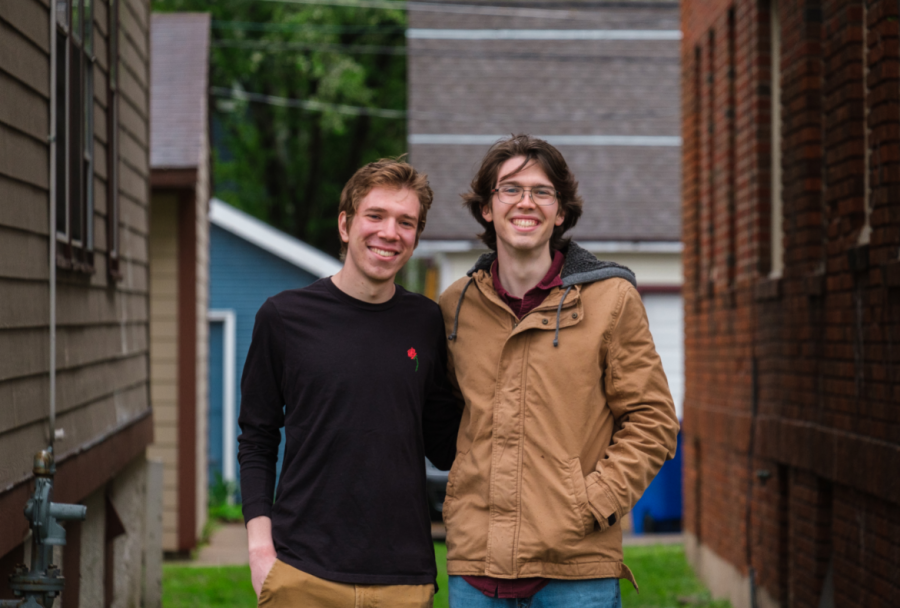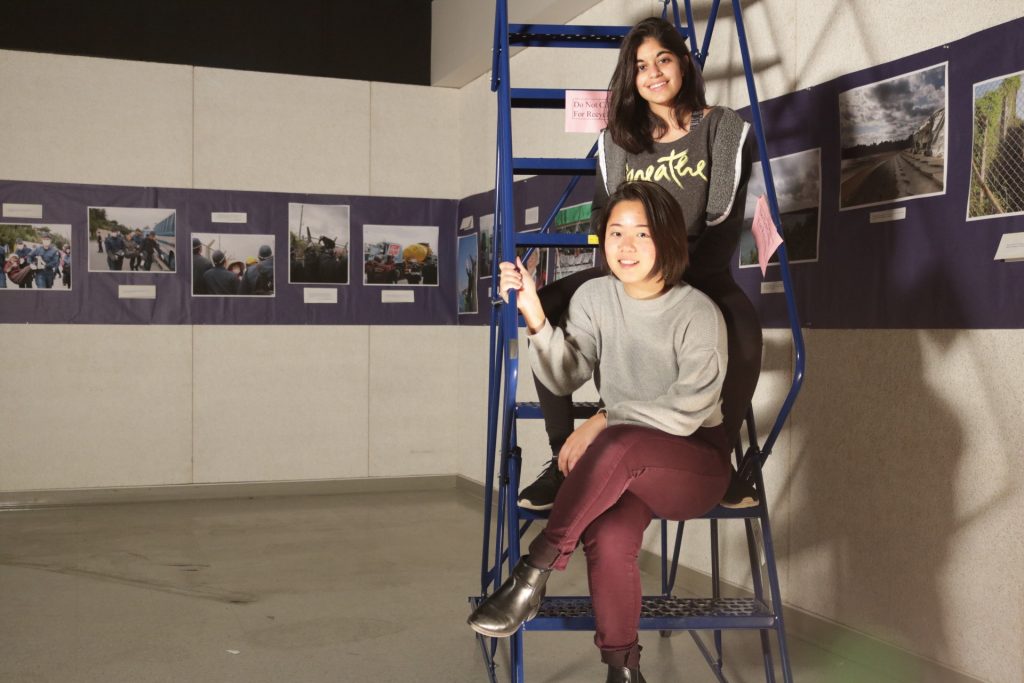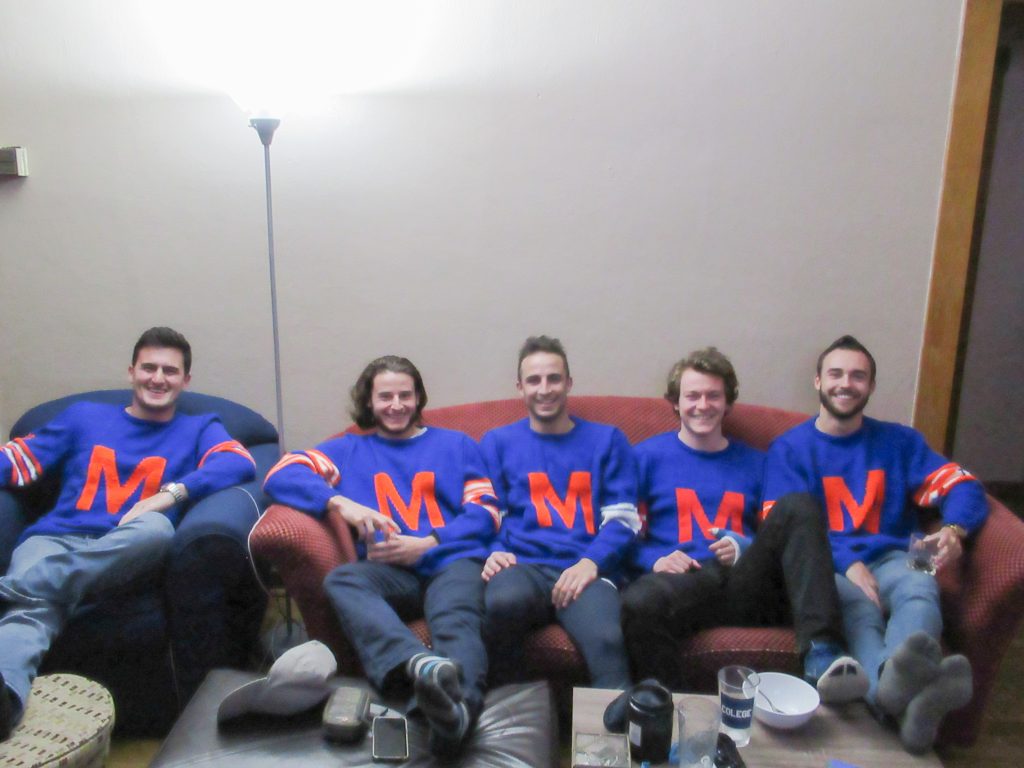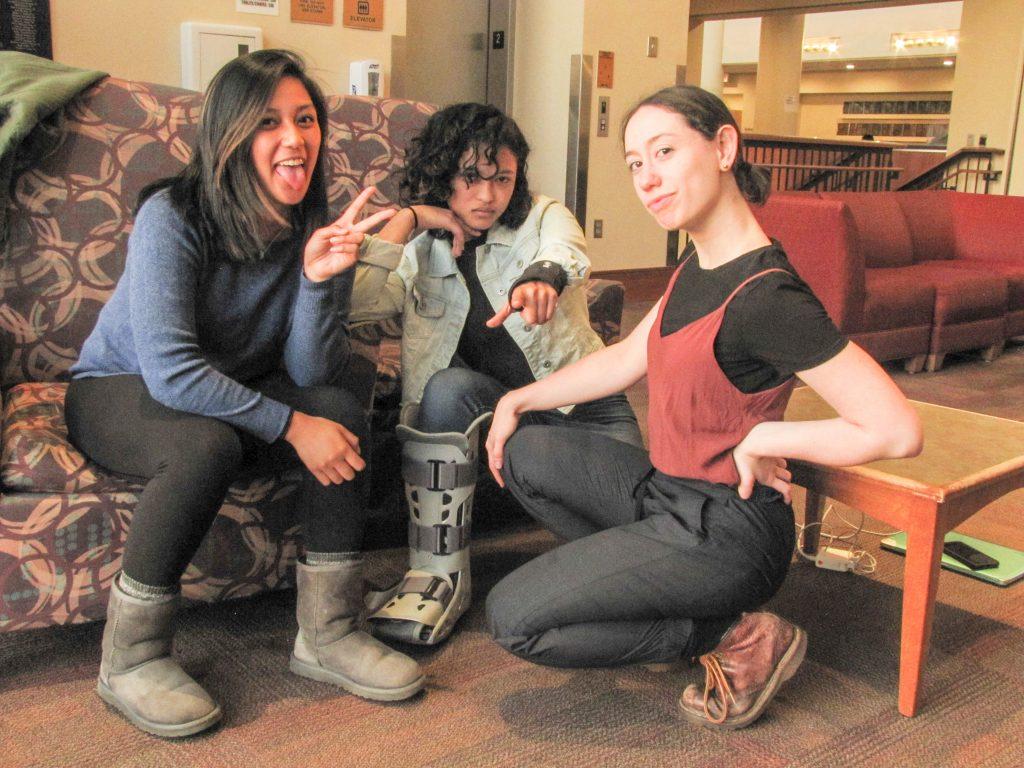
Seniors Kelly Hardin and Lizzy Magnuson first traveled to Lake Atitlán, Guatemala with the Rising Minds J-term trip as first years. They co-led the trip the second time around, and this year they’re leading it again—with some extra travel and responsibilities thrown in—for their last year at Mac. The pair sat down with The Mac Weekly to talk about their shared experiences.
What first got you guys interested in the Rising Minds trip?
Kelly: Well, we both heard about it when we were freshmen. At the time, Alexa Wilcox, who graduated last year, was organizing the trip, and it was the first time that it was ever going to run out of Macalester. I’ve always been really interested in development work and social justice, and as a freshman at Macalester this seemed like an awesome way to really delve into that after having a semester here, starting to learn about these issues in the classroom.
Lizzy: Yeah, so it was just initially introduced as a part of the Macalester Development Group intro meeting. So I just went to that meeting with a friend, I had no idea what it was gonna be about, then Alexa started talking about this awesome thing in Guatemala, and I just kind of went with it from then on. And it has been awesome ever since.
Can you guys describe the general premise of the trip? What is important to you about it?
KH: Rising Minds is a nonprofit that’s focused a lot on educational exchange and community development that’s participatory and sustainable. So basically what that means is they feel that we have a lot to learn from the communities that we’re working with and they also have something to learn from us, so it’s a two-way street. It shouldn’t be an unequal exchange, where we’re the Westerners coming in and saying, “Okay, we’re going to do this volunteer project for you and help you and then we’ll leave.” So I think that we’ve gone into this trip knowing that, yes, we’ll get to volunteer in Guatemala, but just as importantly if not more importantly, we’re trying to view development issues in sort of a holistic way and really learn intentionally from the people we’re staying with. I think that’s very valuable.
LM: We get to make real personal connections with the homestay families that we’re with, and with each other as Macalester students. It’s a really cool way to see how this kind of NGO can work. It’s also a different perspective, I think, than a lot of other NGOs take with the educational and sharing aspect of everything about the trip.
Describe your arrival for the first time in Guatemala and seeing Lake Atitlán.
LM: Well, it was gorgeous. Very, very pretty. The very first time we got there, it was really dark, and we didn’t see anything because it was nine or ten at night when we got introduced to our host families. And I remember me and you [Kelly], we stopped in front of this big, open woods part, and they were like, “Okay! Your house is down there! Down through this dirt path!” We went with the suitcases and just waddled down and met our host family. It was an interesting first few hours.
KH: I don’t know. I think that because I’ve been a couple years at this point, it’s hard to remember exactly what my first impressions were. I do remember stepping off the plane and going out from the airport and seeing Courtney and Owen, the directors [of Rising Minds], standing there with huge grins and a dog, like, “Hello! Welcome to Guatemala!” And we were all so excited.
What are some particularly memorable moments/anecdotes?
LM: Our first year we were staying in the same homestay house, and we were sitting around eating dinner. And I think it was Ruben, the host dad, who was like, “Here, here’s a pepper, you should eat it!” And Kelly asked, “Is it spicy?” And they were like, “No, it’s not spicy. It’s really good! It’s a very well-known Guatemalan pepper, you should try it.” So she takes a HUGE bite. It was a tiny little pepper but she eats the whole thing, and then just all of a sudden just, like, fire.
KH: I was like, “OH my GOD!”
LM: And then they all started cracking up.
KH: Our host mom and dad and daughter.
LM: It was very funny.
KH: We also spent a lot of time playing with our host daughter.
KH: And then coming back the next year and seeing how much she’d grown was really, really awesome. And getting to know new families, because we stayed with different families the second year.
LM: Another really cool thing that we have done in the past, and we’re hoping to do it again, is fishing with the local fishermen early in the morning on the lake where it’s just super calm and you can see all the way across the lake and you’re in this dugout canoe.
KH: It’s really misty.
LM: With a local fisherman who’s been fishing for his whole life. And we talked to him about the ecological problems that the lake has faced in the recent past, and how their livelihood is harmed by that, and just talk to them. Get some cool conversations going. It was really interesting because my guy was super talkative, and I learned how to fish. They just use fishing wire, and they toss it in, and bring it out—
KH: There’s no actual fishing pole.
LM: That was just gorgeous and really fun.
KH: And then finally, while the first week is mostly immersion activities, the second week is really where we start volunteering, and so the two years that we went, we were working with kids and doing educational programs with them. Working with a group of kids is always amazing, especially if you’re crossing linguistic and cultural barriers and realizing you can have an impact on each other despite coming from different places and being different ages. I’ve always really enjoyed that. What are some of the projects you did on your trips?
LM: Two years ago we partnered with a school, the same group of kids we were working with, and we partnered with that school and the community to help build a set of latrines right next to the school because they didn’t have any formal latrines to go to the bathroom. It was a really cool project utilizing the sustainable construction that one of the workers with Rising Minds is kind of the expert of. So we made these two stalls out of bottles filled with either earth or trash, and the community collected all of these things. And then we built up the walls with the bottles and adobe mud and wires and poles, and the community came and put it all together with us, and it was just a really cool thing to see.
KH: It’s important to emphasize that, because it’s a participatory development model, it’s really important to Rising Minds that these are projects that the community really indicates they need and the community is invested in. So we’re not just going in and doing this project for them. They’re working alongside us to do it. And we might be offering technical expertise or extra hands, but really, we’re there as a way to catalyze the project, not as a way to just get it done for them.
What were the most valuable parts of your experience so far?
KH: I think it’s really hard to pick out one most important aspect, but I think that looking over the past three years in the long term, having that continued relationship with Rising Minds has been absolutely incredible. I think that it’s taught me a lot about how nonprofits work, what they actually do on the ground and what impact they can have, and not only successes but also shortcomings of small NGOs. And we’re currently going through leadership training with Rising Minds to do more of the work that they’re doing on the ground when we get there. Not only feeling like I’m making a direct contribution to the nonprofit, but also knowing that they have been so supportive of me as a student wanting to learn about development work, has been absolutely incredible. It’s not an experience that everyone gets to have, so I’m really thankful for that.
LM: I would definitely second that. I also had an opportunity to go down to Guatemala this summer, and I lived with a host family through Rising Minds. It was kind of a separate thing I was doing down there, but I still got to use that connection with this NGO and stayed in the same village and got to volunteer with Rising Minds. It was just a really cool way to continue that partnership with them but also continue on my own path.
What are you looking forward to with the third trip?
LM: I’m really excited to give it more of a health-related spin, because that’s kind of my area of interest, being a Biology/Community and Global Health person. Also this summer doing health-related work, and just through the past through trips that we’ve taken, talking a lot about the health issues in Guatemala but not specifically addressing them with the work we’re doing—well, the latrine was kind of like that. But I think this year we’re going to try to add more of a focus on health maybe with a nutritional garden.
KH: I’m really excited about that. This is where our interests overlap because I’m an International Studies major, but I’m interested in sustainable development work especially as it pertains to both the health of communities and the environment. So we’re looking into making this community garden this year, which will be really, really cool. To not only delve into sustainable agriculture, but see how that garden can be used to do nutritional trainings with mothers in local communities and tie it back to health, as Lizzy said.
What has it meant for you to go through your Rising Minds experiences together?
LM: It’s really interesting. I think we’ve kind of found our places, sort of, within the whole realm. Kelly’s really good at doing the Rising Minds breakdown [snaps fingers], she can just go spiel about it. And I’m, I don’t know, I’m not as eloquent. [laughs] But it’s been really good to have a partner in action.
KH: For sure. And I don’t know if we necessarily would have met or become friends if it hadn’t been for this. Just because, you know, even though we’re a small school—
LM: Different freshman year floors.
KH: Yeah! Different freshman year floors. So that’s been really, really nice. We’re always bouncing ideas off each other and getting each other pumped up for planning. Which is what made planning hard last year when we were here different semesters. But we’re traveling together before the trip and going down early to help out in the office.
More on that?
[laughs] KH: Plans are still forthcoming, but—
LM: I’m determined to go to Tikal.
KH: We have to do that.
LM: Yeah. So that’s the best-preserved Mayan ruins, I think in all of Central America. Maybe in Guatemala. At least. It’s really gorgeous.
KH: It’s kind of like a Mayan-style pyramid type thing.
LM: We’re also going to go down early January, maybe even before, just to connect in the Rising Minds office with the leader, Courtney, and go through the preliminary work on the ground and make all the final connections and final plans.
KH: We’re going to be the ones picking this huge group up from the airport. So it’ll be really strange to be on the other side.
LM: It’ll be CRAZY! But so interesting, definitely. I’m excited.
KH: I feel old.
How do you think you’ll stay involved in that region or in development, or how you’ll carry on this experience?
LM: I really want to keep working in this kind of realm. Maybe even with Rising Minds, depending on what happens in my near future. Maybe helping with their health initiative. That would be awesome.
KH: One reason we’re doing leadership training is that the directors want us to consider leading the trips after we graduate. So that’s a really awesome opportunity. It’s a great option to have once we graduate. But like what’s been said, I’m not really sure what’s ahead of me in the future. I definitely want to do some sort of international development work. I’m still working out what that means. I think that Macalester’s made my definition of that less clear instead of more clear, in many ways, the more I learn about it. But we’ll see where it goes.









